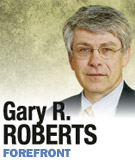Subscriber Benefit
As a subscriber you can listen to articles at work, in the car, or while you work out. Subscribe Now
 As a one-time NFL lawyer who has closely followed sports labor relations for 35 years, I am often asked about the chances of Indianapolis’ losing the 2012 Super Bowl. While no one knows for certain, I believe it likely the 2012 Super Bowl will be saved, but there is still a serious risk that labor strife will shut down the entire 2011 season and with it our Super Bowl.
As a one-time NFL lawyer who has closely followed sports labor relations for 35 years, I am often asked about the chances of Indianapolis’ losing the 2012 Super Bowl. While no one knows for certain, I believe it likely the 2012 Super Bowl will be saved, but there is still a serious risk that labor strife will shut down the entire 2011 season and with it our Super Bowl.
This risk is great because there is a near-perfect storm of circumstances that will almost certainly lead to bitter negotiations, nasty and threatening public pronouncements, congressional and White House jawboning, litigation in several forums, and eventually a work stoppage in the preseason if not the regular season.
Many owners are facing cash-flow losses every year, causing them to insist on rollbacks in what the players earn, while the players are not inclined to take a compensation cut because they see escalating franchise values.
The two principals on either side, Commissioner Roger Goodell and National Football League Players Union chief DeMaurice Smith, are both in their first collective bargaining round and thus lack valuable experience and a close relationship. Both got their jobs by promising base constituencies they would not be weak like their predecessors Paul Tagliabue and Gene Upshaw were last time. Neither leader has the political leeway to make essential compromises.
As a result, it seems almost certain that both sides will dig in their heels and little progress will be made until the unthinkable is upon them.
Add to that the enormous uncertainty surrounding the legal risks each side faces. The union has received almost unanimous player permission to decertify as a union. Once the collective bargaining agreement expires on March 5, the union will probably send a letter to the National Labor Relations Board announcing it is no longer a union, which union lawyers tell them means the players can sue the clubs claiming that any league-wide player rules constitute a conspiracy among the teams in restraint of trade in violation of the Sherman Antitrust Act.
The team owners, on the other hand, believe such a tactic would merely produce a union in disguise that is refusing to bargain in good faith as required by the National Labor Relations Act. Until this crucial legal question is resolved by either a federal court or the NLRB, neither side will be likely to make concessions. And getting that definitive legal ruling may well require months or even years of legal wrangling in different courtrooms and the labor board.
So there is cause for great concern. It seems quite likely the preseason and some regular-season games will be lost to a lockout. But I believe that somehow the parties will figure out how to salvage most of the 2011 season and the Super Bowl, if for no other reason than killing the goose that is laying golden eggs for everyone would be crazy. Somehow, I can’t help but believe that, before losing the entire season, the parties will find sanity, either with a new agreement or at least a truce allowing the games to go on while they continue to negotiate as baseball did in 1995-1996. That, at least, is my hope.
As a footnote, I am not as optimistic about the chances for the NBA’s salvaging its 2011-2012 season after its collective bargaining agreement expires next summer. The two sides are light years apart, with most teams losing boatloads of money every year and demanding that player compensation be reduced over one-third and a hard salary cap be put in place of the current soft cap that every team exceeds.
The players will resist this mightily. Union chief Billy Hunter has said a lockout is 99-percent certain and has encouraged players to save money. Thus, unless cooler heads prevail, next fall could see darkness at both Lucas Oil Stadium and Conseco Fieldhouse.•
____________
Roberts is dean of Indiana University School of Law-Indianapolis, and formerly represented the NFL through a Washington law firm. Send comments on this column to ibjedit@ibj.com.
Please enable JavaScript to view this content.
